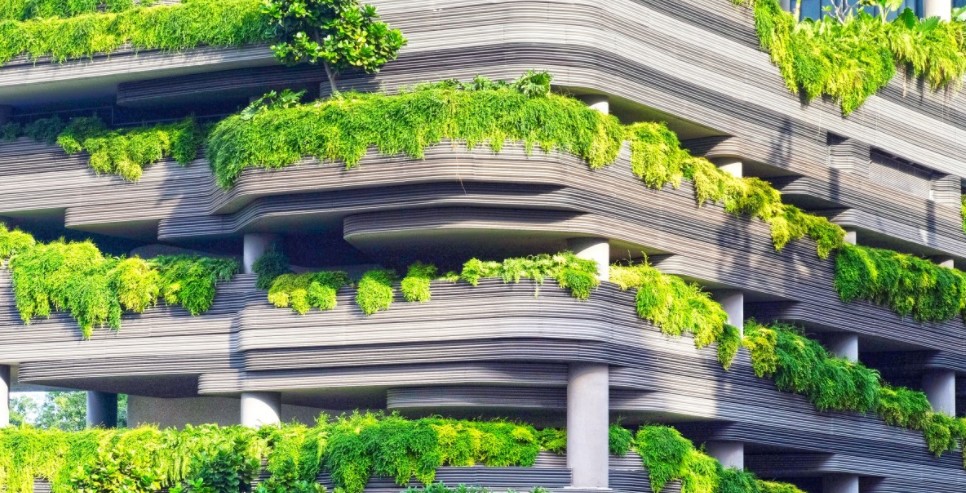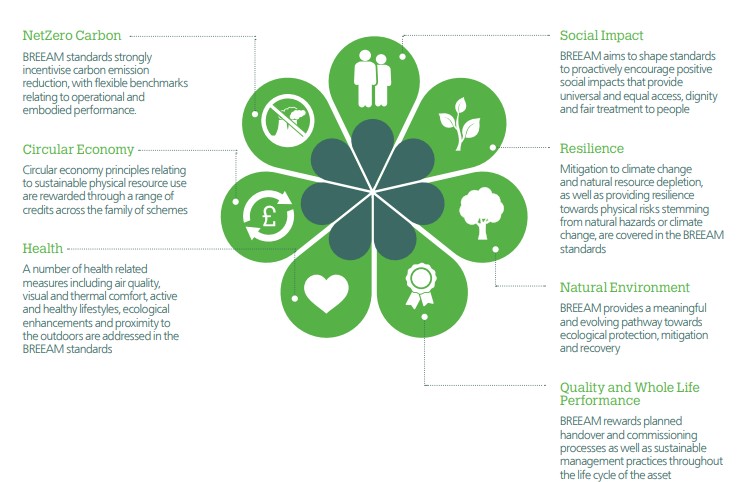Building back better with BREEAM
Contents |
[edit] Introduction
The COVID-19 pandemic has caused an unprecedented public health crisis and the most significant economic shock since the Great Depression, exposing weaknesses in our economy and society. It has also demonstrated what society can achieve by working for a common goal against a common threat.
Demand for a return to a better normal is increasing with the spotlight being shone on global issues - the impending threat of climate change being most prevalent. Without action, the global climate change crisis will cause social and economic damage far greater than those caused by COVID-19.
Together, buildings and construction are responsible for 39% of all carbon emissions. We must build back better.
BREEAM is well placed to help the built environment achieve this in a meaningful way. BREEAM was the world’s first sustainability rating, and BREEAM standards are tailored to address the unique aspects of each life cycle stage in the built environment. BREEAM standards support investors, developers, clients and stakeholders to deliver and validate the sustainability value of their assets and, in doing so, create higher values and lower risks. BREEAM works by bringing multiple disciplines together to focus on one common, holistic framework. It sets performance levels to support a consistent method and offers tradeable and flexibility.
[edit] The BREEAM Building Back Better Hub
BREEAM has been considering its role and responsibility in the effort to build back better. BREEAM’s contribution can be explored in the overarching briefing hub ‘Building Back Better with BREEAM: Supporting the green recovery’.
This resource serves to provide an overview of the various environmental, economic and social issues that BREEAM addresses. The BREEAM position on each of these issues will be detailed in specific briefing papers that will be released over time as the organisation works through the COVID-19 challenge.
The specific topic areas include:
- Net Zero Carbon
- Circular Economy
- Health
- Social Impact
- Resilience
- Natural Environment
- Quality and Whole Life Performance
Find out more at: https://www.breeam.com/building-back-better/.
[edit] Related articles on Designing Buildings Wiki
- BRE articles on Designing Buildings Wiki.
- BREEAM Awards 2021.
- BREEAM Life cycle cost and service life planning.
- BREEAM: The Next Generation.
- Building Back Better: Health.
- Building Back Better: Net zero carbon and BREEAM.
- Building Back Better: Resilience.
- Building Back Better: Social impact.
- Circular economy.
- Health in the built environment.
- Natural environment.
- Net zero carbon 2050.
- Resilience.
- Social Sustainability at Master-planning Stage.
- Whole life costs.
[edit] External resources
Featured articles and news
Do you take the lead in a circular construction economy?
Help us develop and expand this wiki as a resource for academia and industry alike.
Warm Homes Plan Workforce Taskforce
Risks of undermining UK’s energy transition due to lack of electrotechnical industry representation, says ECA.
Cost Optimal Domestic Electrification CODE
Modelling retrofits only on costs that directly impact the consumer: upfront cost of equipment, energy costs and maintenance costs.
The Warm Homes Plan details released
What's new and what is not, with industry reactions.
Could AI and VR cause an increase the value of heritage?
The Orange book: 2026 Amendment 4 to BS 7671:2018
ECA welcomes IET and BSI content sign off.
How neural technologies could transform the design future
Enhancing legacy parametric engines, offering novel ways to explore solutions and generate geometry.
Key AI related terms to be aware of
With explanations from the UK government and other bodies.
From QS to further education teacher
Applying real world skills with the next generation.
A guide on how children can use LEGO to mirror real engineering processes.
Data infrastructure for next-generation materials science
Research Data Express to automate data processing and create AI-ready datasets for materials research.
Wired for the Future with ECA; powering skills and progress
ECA South Wales Business Day 2025, a day to remember.
AI for the conservation professional
A level of sophistication previously reserved for science fiction.
Biomass harvested in cycles of less than ten years.
An interview with the new CIAT President
Usman Yaqub BSc (Hons) PCIAT MFPWS.
Cost benefit model report of building safety regime in Wales
Proposed policy option costs for design and construction stage of the new building safety regime in Wales.
Do you receive our free biweekly newsletter?
If not you can sign up to receive it in your mailbox here.

























